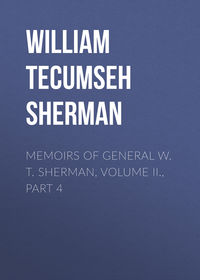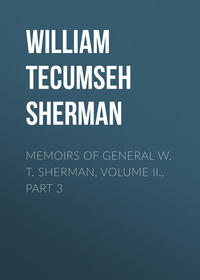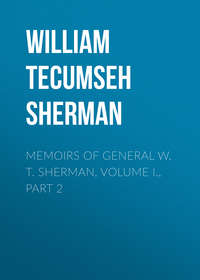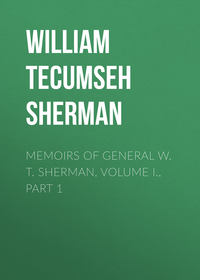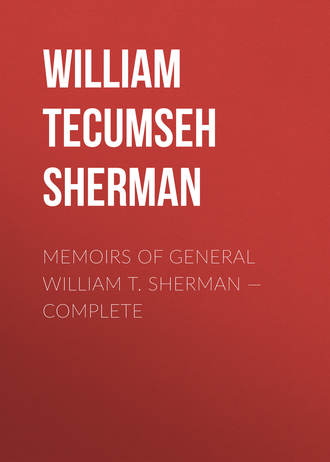 полная версия
полная версияMemoirs of General William T. Sherman — Complete
WASHINGTON D. C., January 27, 1868.
To the President.
DEAR SIR: As I promised, I saw Mr. Ewing yesterday, and after a long conversation asked him to put down his opinion in writing, which he has done and which I now inclose.
I am now at work on these Army Regulations, and in the course of preparation have laid down the Constitution and laws now in force, clearer than I find them elsewhere; and beg leave herewith to inclose you three pages of printed matter for your perusal. My opinion is, if you will adopt these rules and make them an executive order to General Grant, they will so clearly define the duties of all concerned that no conflict can arise. I hope to get through this task in the course of this week, and want very much to go to St. Louis. For eleven years I have been tossed about so much that I really do want to rest, study, and make the acquaintance of my family. I do not think, since 1857, I have averaged thirty days out of three hundred and sixty-five at home.
Next summer also, in fulfillment of our promise to the Sioux, I must go to Fort Phil Kearney early in the spring, so that, unless I can spend the next two months at home, I might as well break up my house at St. Louis, and give up all prospect of taking care of my family.
For these reasons especially I shall soon ask leave to go to St. Louis, to resume my proper and legitimate command. With great respect,
W. T. SHERMAN, Lieutenant-General.[Inclosure]
WASHINGTON, D. C., January 25, 1868.
MY DEAR GENERAL: I am quite clear in the opinion that it is not expedient for the President to take any action now in the case of Stanton. So far as he and his interests are concerned, things are in the best possible condition. Stanton is in the Department, got his secretary, but the secretary of the Senate, who have taken upon themselves his sins, and who place him there under a large salary to annoy and obstruct the operations of the Executive. This the people well enough understand, and he is a stench in the nostrils of their own party.
I thought the nomination of Cox at the proper juncture would have been wise as a peace-offering, but perhaps it would have let off the Senate too easily from the effect of their arbitrary act. Now the dislodging of Stanton and filling the office even temporarily without the consent of the Senate would raise a question as to the legality of the President's acts, and he would belong to the attacked instead of the attacking party. If the war between Congress and the President is to go on, as I suppose it is, Stanton should be ignored by the President, left to perform his clerical duties which the law requires him to perform, and let the party bear the odium which is already upon them for placing him where he is. So much for the President.
As to yourself, I wish you as far as possible to keep clear of political complications. I do not think the President will require you to do an act of doubtful legality. Certainly he will not without sanction of the opinion of his Attorney-General; and you should have time, in a questionable case, to consult with me before called upon to act. The office of Secretary of War is a civil office, as completely so as that of Secretary of State; and you as a military officer cannot, I think, be required to assume or exercise it. This may, if necessary, be a subject for further consideration. Such, however, will not, I think, be the case. The appeal is to the people, and it is better for the President to persist in the course he has for some time pursued--let the aggressions all come from the other side; and I think there is no doubt he will do so. Affectionately, T. EWING.
To--Lieutenant-General SHERMAN.
LIBRARY ROOM, WAR DEPARTMENT,
WASHINGTON, D. C., January 31, 1868.
To the President:
Since our interview of yesterday I have given the subject of our conversation all my thoughts, and I beg you will pardon my reducing the same to writing.
My personal preferences, as expressed, were to be allowed to return to St. Louis to resume my present command, because my command was important, large, suited to my rank and inclination, and because my family was well provided for there in house, facilities, schools, living, and agreeable society; while, on the other hand, Washington was for many (to me) good reasons highly objectionable, especially because it is the political capital of the country; and focus of intrigue, gossip, and slander. Your personal preferences were, as expressed, to make a new department East, adequate to my rank, with headquarters at Washington, and assign me to its command, to remove my family here, and to avail myself of its schools, etc.; to remove Mr. Stanton from his office as Secretary of War, and have me to discharge the duties.
To effect this removal two modes were indicated: to simply cause him to quit the War-Office Building, and notify the Treasury Department and the Army Staff Departments no longer to respect him as Secretary of War; or to remove him and submit my name to the Senate for confirmation.
Permit me to discuss these points a little, and I will premise by saying that I have spoken to no one on the subject, and have not even seen Mr. Ewing, Mr. Stanbery, or General Grant, since I was with you.
It has been the rule and custom of our army, since the organization of the government, that the second officer of the army should be at the second (in importance) command, and remote from general headquarters. To bring me to Washington world put three heads to an army, yourself, General Grant, and myself, and we would be more than human if we were not to differ. In my judgment it world ruin the army, and would be fatal to one or two of us.
Generals Scott and Taylor proved themselves soldiers and patriots in the field, but Washington was fatal to both. This city, and the influences that centre here, defeated every army that had its headquarters here from 1861 to 1864, and would have overwhelmed General Grant at Spottsylvania and Petersburg, had he not been fortified by a strong reputation, already hard-earned, and because no one then living coveted the place; whereas, in the West, we made progress from the start, because there was no political capital near enough to poison our minds, and kindle into life that craving, itching for fame which has killed more good men than bullets. I have been with General Grant in the midst of death and slaughter when the howls of people reached him after Shiloh; when messengers were speeding to and from his army to Washington, bearing slanders, to induce his removal before he took Vicksburg; in Chattanooga, when the soldiers were stealing the corn of the starving mules to satisfy their own hunger; at Nashville, when he was ordered to the "forlorn hope" to command the Army of the Potomac, so often defeated--and yet I never saw him more troubled than since he has been in Washington, and been compelled to read himself a "sneak and deceiver," based on reports of four of the Cabinet, and apparently with your knowledge. If this political atmosphere can disturb the equanimity of one so guarded and so prudent as he is, what will be the result with me, so careless, so outspoken as I am? Therefore, with my consent, Washington never.
As to the Secretary of War, his office is twofold. As a Cabinet officer he should not be there without your hearty, cheerful assent, and I believe that is the judgment and opinion of every fair-minded man. As the holder of a civil office, having the supervision of moneys appropriated by Congress and of contracts for army supplies, I do think Congress, or the Senate by delegation from Congress, has a lawful right to be consulted. At all events, I would not risk a suit or contest on that phase of the question. The law of Congress, of March 2, 1867, prescribing the manner in which orders and instructions relating to "military movements" shall reach the army, gives you as constitutional Commander-in-Chief the very power you want to exercise, and enables you to prevent the Secretary from making any such orders and instructions; and consequently he cannot control the army, but is limited and restricted to a duty that an Auditor of the Treasury could perform. You certainly can afford to await the result. The Executive power is not weakened, but rather strengthened. Surely he is not such an obstruction as would warrant violence, or even s show of force, which would produce the very reaction and clamor that he hopes for to save him from the absurdity of holding an empty office "for the safety of the country."
This is so much as I ought to say, and more too, but if it produces the result I will be more than satisfied, viz., that I be simply allowed to resume my proper post and duties in St. Louis. With great respect, yours truly,
W. T. SHERMAN, Lieutenant-General.On the 1st of February, the board of which I was the president submitted to the adjutant-general our draft of the "Articles of War and Army Regulations," condensed to a small compass, the result of our war experience. But they did not suit the powers that were, and have ever since slept the sleep that knows no waking, to make room for the ponderous document now in vogue, which will not stand the strain of a week's campaign in real war.
I hurried back to St. Louis to escape the political storm I saw brewing. The President repeatedly said to me that he wanted me in Washington, and I as often answered that nothing could tempt me to live in that center of intrigue and excitement; but soon came the following:
HEADQUARTERS ARMY OF THE UNITED STATES,
WASHINGTON, February 10, 1868.
DEAR GENERAL: I have received at last the President's reply to my last, letter. He attempts to substantiate his statements by his Cabinet. In this view it is important that I should have a letter from you, if you are willing to give it, of what I said to you about the effect of the "Tenure-of-Office Bill," and my object in going to see the President on Saturday before the installment of Mr. Stanton. What occurred after the meeting of the Cabinet on the Tuesday following is not a subject under controversy now; therefore, if you choose to write down your recollection (and I would like to have it) on Wednesday, when you and I called on the President, and your conversation with him the last time you saw him, make that a separate communication.
Your order to come East was received several days ago, but the President withdrew it, I supposed to make some alteration, but it has not been returned. Yours truly,
U. S. GRANT.[TELEGRAM.]
WASHINGTON, D. C., February 18, 1868.
Lieutenant-General W. T. SHERMAN, St. Louis.
The order is issued ordering you to Atlantic Division.
U. S. GRANT, General.[TELEGRAM]
HEADQUARTERS MILITARY DIVISION OF THE MISSOURI, St. Louis, February 14, 1868.
General U. S. GRANT, Washington, D. C.
Your dispatch is received informing me that the order for the Atlantic Division has been issued, and that I am assigned to its command. I was in hopes I had escaped the danger, and now were I prepared I should resign on the spot, as it requires no foresight to predict such must be the inevitable result in the end. I will make one more desperate effort by mail, which please await.
W. T. SHERMAN, Lieutenant-General.
[TELEGRAM.]
WASHINGTON, February 14, 1868.
Lieutenant-General W. T. SHERMAN, St. Louis.
I think it due to you that your letter of January 31st to the President of the United States should be published, to correct misapprehension in the public mind about your willingness to come to Washington. It will not be published against your will.
(Sent in cipher.)
[TELEGRAM.]
HEADQUARTERS MILITARY DIVISION OF THE MISSOURI,
St. Louis, MISSOURI, February 14, 1868.
General U. S. GRANT, Washington, D. C.
Dispatch of to-day received. Please await a letter I address this day through you to the President, which will in due time reach the public, covering the very point you make.
I don't want to come to Washington at all.
W. T. SHERMAN, Lieutenant-General.
[TELEGRAM.]
HEADQUARTERS MILITARY DIVISION OF THE MISSOURI,
St. Louis, MISSOURI, February 14, 1868.
Hon. John SHERMAN, United States Senate, Washington, D. C.
Oppose confirmation of myself as brevet general, on ground that it is unprecedented, and that it is better not to extend the system of brevets above major-general. If I can't avoid coming to Washington, I may have to resign.
W. T. SHERMAN, Lieutenant-General.
HEADQUARTERS OF THE ARMY,
WASHINGTON, D. C., February 12, 1868.
The following orders are published for the information and guidance of all concerned:
U. S. GRANT, General.
EXECUTIVE MANSION,
WASHINGTON, D. C., February 12, 1868.
GENERAL: You will please issue an order creating a military division to be styled the Military Division of the Atlantic, to be composed of the Department of the Lakes, the Department of the East, and the Department of Washington, to be commanded by Lieutenant-General W. T. Sherman, with his headquarters at Washington. Until further orders from the President, you will assign no officer to the permanent command of the Military Division of the Missouri.
Respectfully yours,
ANDREW JOHNSON.GENERAL U. S. GRANT,
Commanding Armies of The United States, Washington, D. C.
Major-General P. H. Sheridan, the senior officer in the Military Division of the Missouri, will temporarily perform the duties of commander of the Military Division of the Missouri in addition to his duties of department commander. By command of General Grant:
E. D. TOWNSEND, Assistant Adjutant-General.This order, if carried into effect, would have grouped in Washington:
1. The President, constitutional Commander-in-Chief.
2. The Secretary of War, congressional Commander-in-Chief.
3. The General of the Armies of the United States.
4. The Lieutenant-General of the Army.
5. The Commanding General of the Department of Washington.
6. The commander of the post-of Washington.
At that date the garrison of Washington was a brigade of infantry and a battery of artillery. I never doubted Mr. Johnson's sincerity in wishing to befriend me, but this was the broadest kind of a farce, or meant mischief. I therefore appealed to him by letter to allow me to remain where I was, and where I could do service, real service, and received his most satisfactory answer.
HEADQUARTERS MILITARY DIVISION OF THE MISSOURI,
St. Louis, MISSOURI, February 14, 1868.
General U. S. GRANT, Washington, D. C.
DEAR GENERAL: Last evening, just before leaving my office, I received your note of the 10th, and had intended answering it according to your request; but, after I got home, I got your dispatch of yesterday, announcing that the order I dreaded so much was issued. I never felt so troubled in my life. Were it an order to go to Sitka, to the devil, to battle with rebels or Indians, I think you would not hear a whimper from me, but it comes in such a questionable form that, like Hamlet's ghost, it curdles my blood and mars my judgment. My first thoughts were of resignation, and I had almost made up my mind to ask Dodge for some place on the Pacific road, or on one of the Iowa roads, and then again various colleges ran through my memory, but hard times and an expensive family have brought me back to staring the proposition square in the face, and I have just written a letter to the President, which I herewith transmit through you, on which I will hang a hope of respite till you telegraph me its effect. The uncertainties ahead are too great to warrant my incurring the expense of breaking up my house and family here, and therefore in no event will I do this till I can be assured of some permanence elsewhere. If it were at all certain that you would accept the nomination of President in May, I would try and kill the intervening time, and then judge of the chances, but I do not want you to reveal your plans to me till you choose to do so.
I have telegraphed to John Sherman to oppose the nomination which the papers announce has been made of me for brevet general.
I have this minute received your cipher dispatch of to-day, which I have just answered and sent down to the telegraph-office, and the clerk is just engaged in copying my letter to the President to go with this. If the President or his friends pretend that I seek to go to Washington, it will be fully rebutted by letters I have written to the President, to you, to John Sherman, to Mr. Ewing, and to Mr. Stanbery. You remember that in our last talk you suggested I should write again to the President. I thought of it, and concluded my letter of January 31st, already delivered, was full and emphatic. Still, I did write again to Mr. Stanbery, asking him as a friend to interpose in my behalf. There are plenty of people who know my wishes, and I would avoid, if possible, the publication of a letter so confidential as that of January 31st, in which I notice I allude to the President's purpose of removing Mr. Stanton by force, a fact that ought not to be drawn out through me if it be possible to avoid it. In the letter herewith I confine myself to purely private matters, and will not object if it reaches the public in any proper way. My opinion is, the President thinks Mrs. Sherman would like to come to Washington by reason of her father and brothers being there. This is true, for Mrs. Sherman has an idea that St. Louis is unhealthy for our children, and because most of the Catholics here are tainted with the old secesh feeling. But I know better what is to our common interest, and prefer to judge of the proprieties myself. What I do object to is the false position I would occupy as between you and the President. Were there an actual army at or near Washington, I could be withdrawn from the most unpleasant attitude of a "go-between," but there is no army there, nor any military duties which you with a host of subordinates can not perform. Therefore I would be there with naked, informal, and sinecure duties, and utterly out of place. This you understand well enough, and the army too, but the President and the politicians, who flatter themselves they are saving the country, cannot and will not understand. My opinion is, the country is doctored to death, and if President and Congress would go to sleep like Rip Van Winkle, the country would go on under natural influences, and recover far faster than under their joint and several treatment. This doctrine would be accounted by Congress, and by the President too, as high treason, and therefore I don't care about saying so to either of them, but I know you can hear anything, and give it just what thought or action it merits.
Excuse this long letter, and telegraph me the result of my letter to the President as early as you can. If he holds my letter so long as to make it improper for me to await his answer, also telegraph me.
The order, when received, will, I suppose, direct me as to whom and how I am to turn over this command, which should, in my judgment, not be broken up, as the three departments composing the division should be under one head.
I expect my staff-officers to be making for me within the hour to learn their fate, so advise me all you can as quick as possible.
With great respect, yours truly,
W. T. SHERMAN, Lieutenant-General.To the President.
DEAR SIR: It is hard for me to conceive you would purposely do me an unkindness unless under the pressure of a sense of public duty, or because you do not believe me sincere. I was in hopes, since my letter to you of the 31st of January, that you had concluded to pass over that purpose of yours expressed more than once in conversation--to organize a new command for me in the East, with headquarters in Washington; but a telegram from General Grant of yesterday says that "the order was issued ordering you" (me) "to Atlantic Division"; and the newspapers of this morning contain the same information, with the addition that I have been nominated as brevet general. I have telegraphed my own brother in the Senate to oppose my confirmation, on the ground that the two higher grades in the army ought not to be complicated with brevets, and I trust you will conceive my motives aright. If I could see my way clear to maintain my family, I should not hesitate a moment to resign my present commission, and seek some business wherein I would be free from these unhappy complications that seem to be closing about me, spite of my earnest efforts to avoid them; but necessity ties my hands, and I must submit with the best grace I can till I make other arrangements.
In Washington are already the headquarters of a department, and of the army itself, and it is hard for me to see wherein I can render military service there. Any staff-officer with the rank of major could surely fill any gap left between these two military officers; and, by being placed in Washington, I will be universally construed as a rival to the General-in-Chief, a position damaging to me in the highest degree. Our relations have always been most confidential and friendly, and if, unhappily, any cloud of differences should arise between us, my sense of personal dignity and duty would leave me no alternative but resignation. For this I am not yet prepared, but I shall proceed to arrange for it as rapidly as possible, so that when the time does come (as it surely will if this plan is carried into effect) I may act promptly.
Inasmuch as the order is now issued, I cannot expect a full revocation of it, but I beg the privilege of taking post at New York, or any point you may name within the new military division other than Washington. This privilege is generally granted to all military commanders, and I see no good reason why I too may not ask for it, and this simple concession, involving no public interest, will much soften the blow, which, right or wrong, I construe as one of the hardest I have sustained in a life somewhat checkered with adversity. With great respects yours truly,
W. T. SHERMAN, Lieutenant-General.WASHINGTON, D. C., 2 p.m., February 19, 1888.
Lieutenant-General W. T. SHERMAN, St. Louis, Missouri:
I have just received, with General Grant's indorsement of reference, your letter to me of the fourteenth (14th) inst.
The order to which you refer was made in good faith, and with a view to the best interests of the country and the service; as, however, your assignment to a new military division seems so objectionable, you will retain your present command.
ANDREW JOHNSON.On that same 19th of February he appointed Adjutant, General Lorenzo Thomas to be Secretary of War ad interim, which finally resulted in the articles of impeachment and trial of President Johnson before the Senate. I was a witness on that trial, but of course the lawyers would not allow me to express any opinion of the President's motives or intentions, and restricted me to the facts set forth in the articles of impeachment, of which I was glad to know nothing. The final test vote revealed less than two thirds, and the President was consequently acquitted. Mr. Stanton resigned. General Schofield, previously nominated, was confirmed as Secretary of War, thus putting an end to what ought never to have happened at all.


